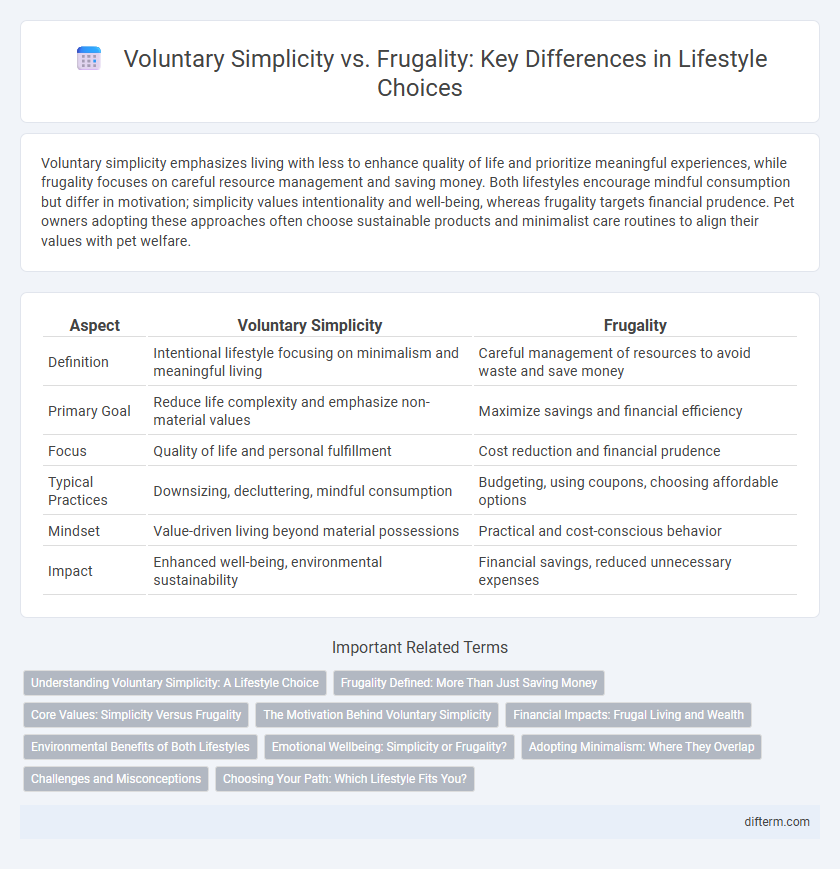Voluntary simplicity emphasizes living with less to enhance quality of life and prioritize meaningful experiences, while frugality focuses on careful resource management and saving money. Both lifestyles encourage mindful consumption but differ in motivation; simplicity values intentionality and well-being, whereas frugality targets financial prudence. Pet owners adopting these approaches often choose sustainable products and minimalist care routines to align their values with pet welfare.
Table of Comparison
| Aspect | Voluntary Simplicity | Frugality |
|---|---|---|
| Definition | Intentional lifestyle focusing on minimalism and meaningful living | Careful management of resources to avoid waste and save money |
| Primary Goal | Reduce life complexity and emphasize non-material values | Maximize savings and financial efficiency |
| Focus | Quality of life and personal fulfillment | Cost reduction and financial prudence |
| Typical Practices | Downsizing, decluttering, mindful consumption | Budgeting, using coupons, choosing affordable options |
| Mindset | Value-driven living beyond material possessions | Practical and cost-conscious behavior |
| Impact | Enhanced well-being, environmental sustainability | Financial savings, reduced unnecessary expenses |
Understanding Voluntary Simplicity: A Lifestyle Choice
Voluntary simplicity emphasizes intentional living by minimizing material possessions and consumption to enhance personal fulfillment and environmental sustainability. This lifestyle choice prioritizes meaningful experiences and relationships over accumulating wealth, promoting mental clarity and reduced stress. Unlike frugality, which primarily focuses on saving money, voluntary simplicity encompasses a holistic approach to life that values purpose and well-being.
Frugality Defined: More Than Just Saving Money
Frugality encompasses a mindful approach to spending that prioritizes value and long-term financial health beyond mere cost-cutting. It involves deliberately choosing quality over quantity, minimizing waste, and making informed decisions that support sustainable living. This lifestyle strategy fosters financial freedom and reduces environmental impact through conscious consumption habits.
Core Values: Simplicity Versus Frugality
Voluntary simplicity emphasizes minimalism and intentional living focused on reducing material possessions to enhance personal well-being and environmental sustainability, while frugality centers on careful resource management and cost-saving strategies without necessarily minimizing consumption. Core values of voluntary simplicity include mindfulness, self-sufficiency, and ecological responsibility, contrasted with frugality's values of thrift, financial prudence, and maximizing utility. Understanding these distinctions helps individuals align their lifestyle choices with deeper personal or economic priorities, fostering contentment and sustainability.
The Motivation Behind Voluntary Simplicity
Voluntary simplicity stems from a conscious desire to reduce material possessions and consumption to enhance personal well-being and environmental sustainability. Motivated by values such as mindfulness, intentional living, and decreased ecological impact, it prioritizes quality of life over accumulating wealth. This lifestyle embraces minimalism as a path to fulfillment, contrasting with frugality's primary focus on financial savings and cost-cutting.
Financial Impacts: Frugal Living and Wealth
Voluntary simplicity emphasizes minimalism and intentional living, reducing expenses to enhance quality of life rather than accumulating wealth. Frugality focuses on cost-saving strategies that directly contribute to building financial reserves and long-term wealth. Adopting frugal habits such as budgeting, avoiding debt, and prioritizing needs over wants significantly impacts wealth accumulation and financial stability.
Environmental Benefits of Both Lifestyles
Voluntary simplicity and frugality both promote reduced consumption, significantly lowering carbon footprints and minimizing waste production. By prioritizing sustainable resource use, these lifestyles contribute to conserving natural habitats and reducing pollution levels. Embracing either approach supports environmental preservation and fosters a more sustainable relationship with the planet.
Emotional Wellbeing: Simplicity or Frugality?
Choosing voluntary simplicity over frugality often leads to enhanced emotional wellbeing by prioritizing meaningful experiences and intentional living rather than merely cutting expenses. Simplicity fosters mindfulness and reduces stress through decluttering life's demands, whereas frugality can sometimes provoke anxiety by emphasizing strict financial restraint. Embracing simplicity supports long-term emotional balance by encouraging contentment and purposeful choices beyond material savings.
Adopting Minimalism: Where They Overlap
Adopting minimalism involves embracing voluntary simplicity and frugality as complementary lifestyle choices aimed at reducing excess and focusing on intentional living. Both approaches prioritize mindful consumption, financial discipline, and decluttering physical and mental spaces to enhance overall well-being. Their overlap lies in cultivating habits that foster contentment, sustainability, and purposeful use of resources.
Challenges and Misconceptions
Voluntary simplicity often faces misconceptions of extreme deprivation, yet it challenges individuals to redefine value beyond material wealth. Frugality is frequently mistaken for stinginess, while it actually promotes mindful spending and long-term financial health. Both lifestyles demand persistent effort to resist societal pressures of consumerism and cultural norms favoring excess.
Choosing Your Path: Which Lifestyle Fits You?
Voluntary simplicity emphasizes reducing material possessions to focus on life's meaningful experiences, promoting intentional living and mental well-being. Frugality centers on economic prudence, prioritizing saving money and minimizing expenses without sacrificing essentials. Assessing personal values and goals helps determine whether a minimalistic mindset or a budgeting strategy better aligns with your lifestyle aspirations.
voluntary simplicity vs frugality Infographic

 difterm.com
difterm.com